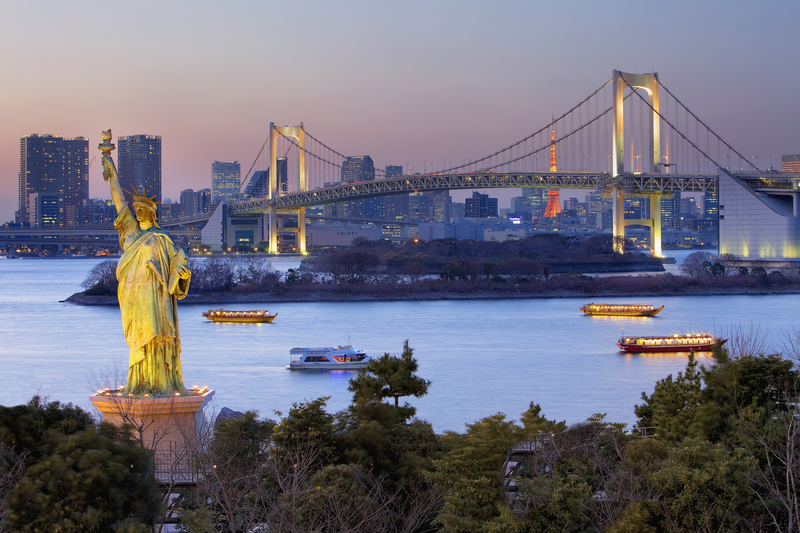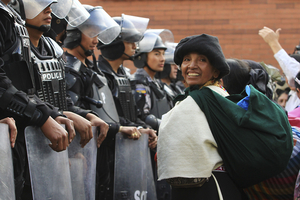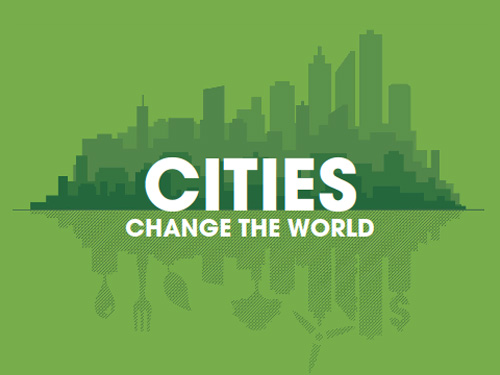Cities are places where conflicts occur between economic, political and civic actors, who invent original governance models and structure their networks on a global scale. They have to strengthen these connections in order to keep their place in a world of social and technological innovation. Will they be able to act together in response to geopolitical and climate-related threats?
As far back as 1963, Francesco Rosi’s famous film Hands Over the City described the city as an arena for confrontations between property investors, inhabitants and local democracy. With metropolitanisation, such dramas are taking place against a new global backdrop. The concept of “metropolitanisation” describes the role of large cities in international economic systems, focusing on the effects of this transformation on governance and the urban development of metropolitan areas. The globalisation, tertiarisation and financialisation of business has made them into strategic territories, thanks to their ability to group together services and skills and consolidate flows of people, information and capital. By the same token, these cities have naturally become places where players of the new economy establish themselves. This explains what Richard Florida calls the shift from the “crisis of decline” to the “crisis of success” in large cities1. Unattractive, poverty- stricken and bankrupt in the 1970s, they are now magnets for “metropolitan executives” and the “creative classes”. Instead of suburban sprawl, we see an unprecedented concentration of investment in the hearts of large urban areas, with all the social and regional problems this brings in its wake: property speculation, rocketing housing costs, increased segregation (read article by Emmanuel Trouillard), etc.
Private stakeholders in the city
The importance of private stakeholders in the financing of cities—whether it be for office buildings, institutional investment in housing, or creating private museums or shopping facilities, is nothing new, however. Dominique Lorrain has highlighted the privatisation of utilities and the increasingly widespread management of urban amenities by large firms as far back as the 1980s2. Ludovic Halbert has described the key role of financial markets in urban production, running counter to the traditional approach that relies on public decision- making3. Metropolitanisation leads to the global integration of urban development and to a kind of uniformity, with the circulation and standardisation of urban financing models by major globalised actors. This process seems to be increasing. Where investments could once be guided by mainly local economic ecosystems, the question of a disconnection is now being raised. Are investments in London real estate still determined by local demand, including that of the international companies that move there, or do they mainly respond to the expectations of liquidities seeking to invest there (article by Martine Drozdz, p.157)? In other words, does the metropolitan real estate dynamic not increasingly resemble that of Dubai, dictated by external financial interests instead of a specific economic context and the needs of local residents? The other major evolution comes from the emergence of new actors in urban management: digital platforms (interview with Isabelle Baraud-Serfaty and Renaud Le Goix). Services are no longer decided upon and delegated by public authorities, but instead identified and defined by multinationals with technical and financial resources far greater than those of local authorities. Privatisation is extending not only into public space, but also, and above all, into user data.
Cooperation on all scales
In this context, the decision-making capacity of local elected governments, and thus the democratic reality of metropolitan contexts, is being challenged. Large cities have perceived the challenge posed by international private interests and have made this dimension into a resource. Metropolitan networks are places where best practices can be shared and models circulated. They can also be mobilised to act in local and global political contexts (article by Éric Huybrechts and Lola Davidson). These networks now position large cities on geopolitical maps once reserved for nation states. This can be seen, for instance, in the United States, with the We are still in alliance of cities that oppose Donald Trump’s withdrawal from the Paris agreement. It is also true in certain particularly advanced macro-regional contexts, as in the Baltic space where cities are working on a common vision (article by Douglas Gordon). But let us make no mistake: the recognition of the importance of urban environments in world affairs, enshrined by the signature of the New Urban Agenda (“Habitat III”) under the aegis of the UN in 2016, also reminds us that states still retain control. Cities, which are not subject to international law, still do not bring their full weight to multilateral discussions. The process of emancipation from national contexts is moreover a source of criticism and political conflict. This is shown by the geography of the Brexit vote, which reveals a fracture between cities that voted Remain and the rest of the UK. Even though certain rural areas in France and Europe remain prosperous, cities are seen as the big winners in the globalisation game: faced with suburban and rural areas in crisis, they now also have to develop cooperation on a regional scale. This is especially true in France, where the “Gilets Jaunes” movement is rooted in a long tradition of mistrust with respect to large cities. This particular sensibility towards the balance of urban and rural areas maybe explains why France is so very creative in terms of regional governance and inter-regional cooperation: interSCoT (a regional coherence scheme), urban-rural reciprocity contracts, metropolitan hubs, state/ city pacts, etc4. Advanced experiences in the field of metropolitan governance can be observed in Canada (Montreal), Mexico (Guadalajara) and Norway (Oslo). And very interesting initiatives are being carried out in the context of “new regionalism” in Italy, with the metropolitan region of Bologna, and in Germany, where the Metropolregionen connect local authorities with economic actors within large-scale, flexible organisations.
Democratic innovations
In many contexts, regional governments provide responses to this search for solidarity between metropolitanised areas and urban or rural peripheries as part of the transition process. Conversely, a number of regions are looking for more local solutions. How could it be otherwise when mega-cities with populations of several tens of millions are now a reality? The major federalist states of Latin America, in particular, are seeking to reinforce decentralisation in their capital cities. For example in the new Ciudad de Mexico, the democratisation of metropolitan government (now disconnected from the power of the federal state) goes hand in hand with the increased independence of the municipalities, which are now alcaldías (towns with elected mayors). Challenges to the modes of operation of these authorities also take more radical forms, calling into question the primacy of public decision- making and allowing ordinary citizens to play a more direct role. Whether the subject be “tactical and collaborative planning” (article by Paul Lecroart), “placemaking”, or the incursion of digital with “civic techs”, the challenge is both to integrate user expertise into projects and urban management and to empower local residents. Democratic experiments are not restricted to ad hoc initiatives in local neighbourhoods, and local mobilisations can lead to advocacy on key metropolitan issues such as water or energy production or the modus operandi of property markets. This means that they ultimately make local governments more open to civil society. This movement, dubbed “new municipalism” (inspired by the work of the American essayist Murray Bookchin in the 1970s), has been most active between 2015 et 2019, with citizens’ collectives winning seats in council elections in large Spanish cities including Madrid and Barcelona. These dynamics reinforcing the democratic dimension of metropolitan policies are visible in the international arena, in technical cooperation programmes (article by Paul Lecroart) such as those of the Association Internationale des Techniciens, Experts et Chercheurs (AITEC), or political initiatives, for example United Cities and Local Governments (UCLG).
The future of cities
Metropolitanisation has led to the internationalisation of the work of the actors involved and new balances between economic, institutional and civic interests. But what will happen as the twenty-first century moves forward, in a world that might shrink or fragment in political and geographical terms? What role will cities play in a context where free trade is being challenged and where frontiers and national frameworks are returning (see interview with Patrick Le Galès)? What does the future hold for the flows these cities organise, in an epoch of climate change and energy constraints? Demographic forecasts show that the territories of urbanisation, and thus potentially of innovation and trade, will shift not only towards the very large cities of India and Africa, but also towards a broader network of mid-sized cities. The scenarios, and even the paradigms, are not unique: choices between the “car-oriented city”, the “sustainable city” and the “smart city” do not hinder hybridisations and incremental change (article by Jean Haëntjens), and other, potentially divergent, metropolitan models will have to be developed, especially in emerging economies (article by Greg Clark and Tim Moonen). Fields of investigation are opening up for what Michel Lussault calls the new “science of the anthropocene urban environment”. How can space in large cities be redefined to make them more self-sufficient and provide them with more resources, more control over their externalities, more resilience, and thus greater regional integration? How can we reconcile this necessarily increased autonomy with maintaining the function of cities as centres of exchange? The cultural revolution remains to be accomplished among planners, whose responsibilities seem huge.
Léo Fauconnet, Political Scientist and Urbanist, L’Institut Paris Region
1. Richard Florida, The new urban crisis, Basic Books, 2017, 336 p.
2. Dominique Lorrain, La main discrète. La finance globale dans la ville, Revue française de science politique, 2011.
3. Ludovic Halbert et al., The financialisation of urban production: Conditions, mediations and transformations, Urban Studies, 2016.
4. Commissariat général à l’égalité des territoires, Les coopérations interterritoriales www.cget.gouv.fr


